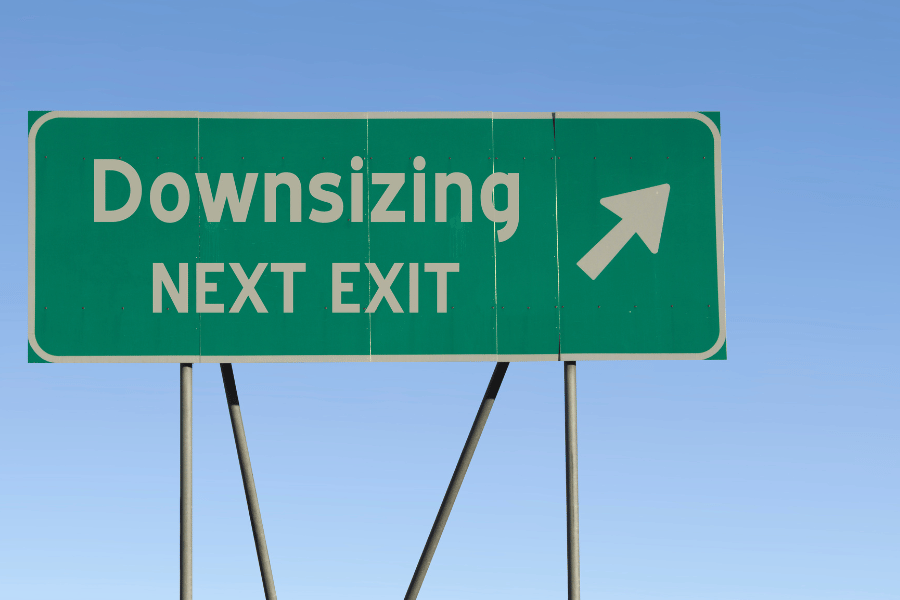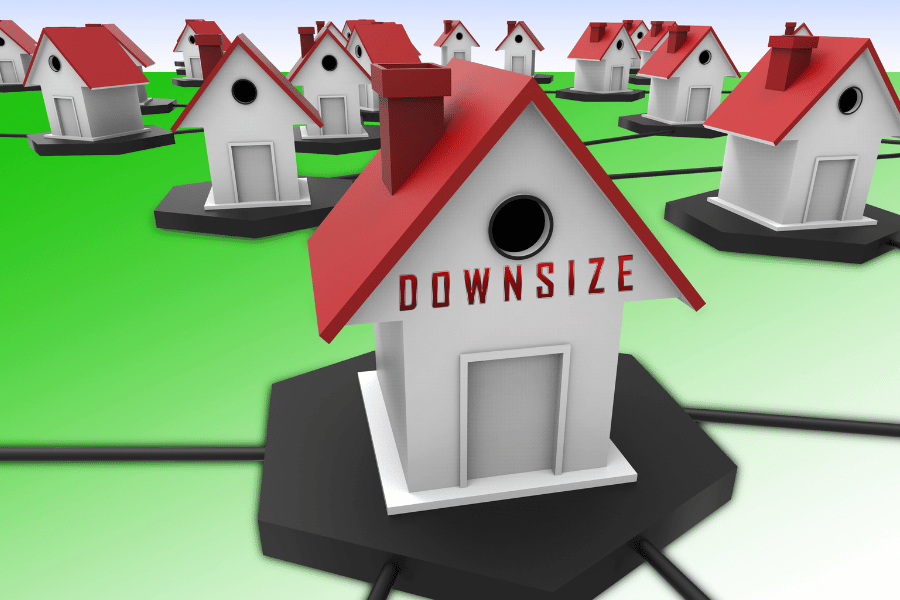Benefits of Downsizing Your Home
Are you thinking about downsizing your home and want to understand the benefits? Here are all the benefits and essential considerations before downsizing.
Downsizing is not about settling for less but living better. It's about prioritizing experiences and financial security over square footage. If you feel stretched thin by your current living situation or simply want less stuff and more freedom, downsizing may be the best thing for you.
With "tiny" houses becoming a hot trend, more Americans are considering downsizing their homes. You may be thinking about this because your children have left home, you're close to retirement, you want a lighter ecological footprint, or you're tired of maintaining a big home.
As you get older, downsizing to a smaller house with an open floor plan may be more appealing. It can free up cash, save you money on bills, and mean you live in a property better suited to your needs. Before making that large decision, you should consider all the pros and cons of downsizing a home.
However, the unexpected benefits of downsizing your home are significant. You may find that your home is a lot easier to part with when you move to a new home, offering a lifestyle you love. Always assess whether your current home is the best fit for the lifestyle that you want in the next chapter of your life.
Here are the benefits of downsizing your home.
1. Financial Benefits
If you have paid off your home or have been paying down your mortgage for years, downsizing can significantly boost your budget. You will have more funds to travel, eat out, enjoy adventures, or do whatever you want to do.
Saving money is the primary reason homeowners downsize their homes. Your mortgage is likely your biggest expense so that downsizing could save you hundreds of dollars monthly.
Moving into a smaller home means reducing property taxes, utility bills, and home maintenance costs. Smaller homes generally result in lower heating, cooling, and electricity expenses, and the fees for repairs and upkeep are typically less due to reduced square footage. These savings can accumulate over time, allowing you to save more money and enjoy a more manageable financial situation.

2. Save on Mortgage
Not many people can afford to buy a home outright. If you are downsizing from a larger home, you might have the equity to buy a new home with cash, but you might also consider using a mortgage to make the purchase.
Choosing a smaller living space has its perks, one of which is the financial benefit of downsizing based on your mortgage. Moving to a less expensive home can significantly reduce your mortgage payments.
Buying a less expensive home can also allow you to switch from a 30-year mortgage to a 15 or 20-year loan. Paying off your home sooner will reduce the amount of money you spend on interest and help you have more financial freedom.
3. Cheaper Home Insurance
Home insurance tends to be less expensive for smaller properties. Although rates vary depending on location, staying in the same area almost guarantees that downsizing will save you money on insurance.
Property taxes and home insurance premiums are lower when choosing a smaller, less expensive house. Downsizing your home will definitely lead to lower insurance premiums because the size of your home significantly influences the cost of insurance.

4. Simplified Living
Simplified living, or minimalism, is a deliberate lifestyle choice that leads to a more meaningful and stress-free life. It involves prioritizing the essentials and eliminating the unnecessary, allowing you to focus more on what truly matters.
From decluttering and organizing your space to downsizing your home, simplifying your life is a practical step towards creating an environment that fosters mindfulness and intentionality in your everyday life.
Downsizing and simplifying must start with your mind. It's crucial to eliminate things and reject activities that don't contribute to your happiness. The most difficult task is to clear your mind. Once you achieve that, you will undoubtedly feel much better about decluttering your life and belongings.
5. Mobility and Flexibility
Smaller homes offer greater mobility. For those who want to travel or move frequently, a smaller home is less of a burden. It's especially beneficial for those seeking a nomadic or semi-nomadic lifestyle, as a smaller home is easier to rent out and leave behind. Excess furniture and other items can be sold or stored, making it easier to settle down again.
Flexibility is a key advantage of downsizing. With fewer belongings and a more manageable living space, individuals can adapt swiftly to life changes, such as adjustments in family size or sudden travel plans. This streamlined way of living fosters a sense of freedom and agility, enabling a more spontaneous and responsive approach to both challenges and opportunities.

6. Retirement Planning
Retirement planning is crucial for a more manageable and financially sustainable lifestyle in later years. Downsizing allows retirees to stretch their savings further and provides flexibility in budgeting for rewarding activities like travel, hobbies, and healthcare.
A smaller home is more accessible and easier to maintain as mobility and health needs change with age, creating a more enjoyable and stress-free retirement life.
Overall, downsizing your home can be a good way to save money and plan for your retirement. Here are some things to consider when downsizing your home for retirement:
- Tax implications
- Mortgage burden
- Home value
- Home sale cost
- Housing market
- Maintenance
- Utility cost
- Health and wellbeing
7. Better Location Options
Downsizing presents the opportunity to live in more desirable locations that may have been unaffordable with a larger property. This is advantageous for those seeking a vibrant lifestyle closer to city centers or cultural hubs. Smaller homes, such as apartments or townhomes in prime locations, offer easy access to amenities like restaurants and malls, enhancing daily life with convenience and diverse experiences.
For nature enthusiasts, downsizing may mean the possibility of a home near the countryside, beach, or mountains for a more peaceful environment and direct access to outdoor activities.
In urban settings, a smaller home can also provide better public transportation, reducing reliance on a car and decreasing living costs. In both scenarios, downsizing can significantly improve one's lifestyle and quality of life.
8. Lower Utility Bills
Heating or cooling a large home in the winter or summer inevitably leads to substantial energy bills. If you find it challenging to keep your home at a comfortable temperature, downsizing may be the most practical solution.
Smaller homes are inherently more energy-efficient, leading to a significant decrease in utility bills. Downsizing reduces your environmental impact and saves you money.
In line with the growing trend of energy-efficient homes, downsizing to a smaller house is a straightforward way to achieve this. Additionally, you can implement features in your home that will result in long-term cost savings.
9. Downsizing Checklist
Preparation is key when you are considering downsizing. Below is an overall list of things you should consider.
- Start early
- Figure out a budget
- Look at different locations
- Begin the packing
- Eliminate rooms you won't have
- Get rid of duplicates
- Reduce collections
- Sell or regift items
- Allow time to reminisce
- A chance to bond
When you decide to downsize your home, it's crucial to have a solid plan. Before making any decisions, you must understand the housing market, your financial situation, and the value of your current home. These factors will significantly influence your timing and choice of a new home.

10. Why Should I Downsize
People downsize for many reasons. If you are contemplating downsizing, here are some compelling reasons why you should consider doing so: Some people downsize to save money, while others do it to reduce the burden of maintaining a large house.
Save Money
As previously stated, the primary reason for downsizing is to save money. Many people purchase larger homes in their early adulthood as they start families or advance in their careers. However, as retirement nears or when children move out, maintaining a large home can become a financial burden. Downsizing allows for reduced monthly payments, lower property taxes, and decreased overall upkeep costs.
Less Maintenance
When it comes to homes, remember that the larger the home, the more maintenance it will require. Home maintenance is not only time-consuming but also costly. Smaller homes are easier to maintain and can be cheaper to fix. Consider renting a home or apartment where maintenance is included in the rent to avoid being responsible for these tasks.
Safety
Living in a large home can be challenging, especially if you are living with limited mobility. Homes with many stairs, tight hallways, or poor lighting can increase risks and jeopardize your safety. While you can modify your home, downsizing is sometimes easier and cheaper.
Is it Time to Downsize?
Several indicators may suggest the need to downsize your home. These include having a mortgage payment that exceeds 28% of your gross income, struggling to keep up with maintenance, feeling dissatisfied with your current lifestyle, lacking adequate space, and experiencing a significant increase in the value of your home.
It's never too early or too late to downsize. If you are experiencing these, you may want to consider doing so:
- Difficulty keeping up with bills
- Need help with home maintenance
- No longer move through your home with ease
- Avoid certain rooms in your home
- Don't have loved ones near
Methodology
We used information from different sources and our data to create this guide on the benefits of downsizing your home. We combined various data sets to help you learn more about them.
The following are a few sources we used to gather most of our information about downsizing benefits.
FAQS
Is it worth it to downsize a house?
Moving into a smaller home or to a more affordable neighborhood can help lower your monthly expenses and maintenance costs and maybe even generate extra cash for sale. Still, it is important to factor in the potential taxes into any decision.
What is the best age to downsize your home?
This question has no answer because it depends on your individual circumstances and lifestyle. However, according to research, many people contemplate downsizing as they approach retirement, which is typically around their late 50s to early 60s.
What is the downside of downsizing?
It can be challenging to downsize if you have been used to having a lot more space, so you may have to consider a big clearout or putting some of your belongings into storage. If you can't imagine your items fitting into a smaller space, you may not want to consider downsizing.

Benefits of Downsizing Your Home - The Bottom Line
In a recent survey, a striking 88% of individuals aged 50 to 80 expressed a strong preference for aging in place. The desire to maintain independence was a key factor driving this sentiment. While aging in place offers numerous benefits, downsizing presents an opportunity to alleviate financial stress and safety concerns without compromising independence.
Downsizing your home offers a range of benefits, including saving money and managing a more manageable property. It's crucial to carefully consider the costs associated with downsizing as well.
The benefits of downsizing are substantial and cater to various lifestyle preferences, from gaining financial freedom to experiencing emotional relief from a decluttered living space to the joy of living in a more desirable location.
If you are considering moving or selling, contact us or visit our website. Our team at Raleigh Realty is here to help you with any home buying or selling needs.



